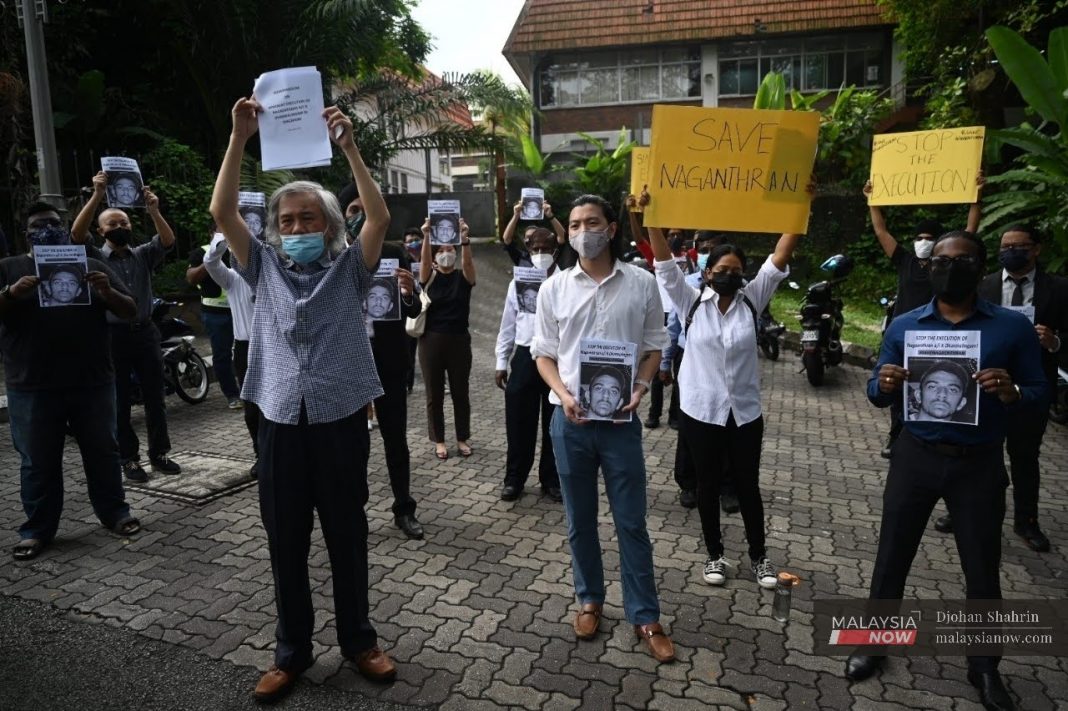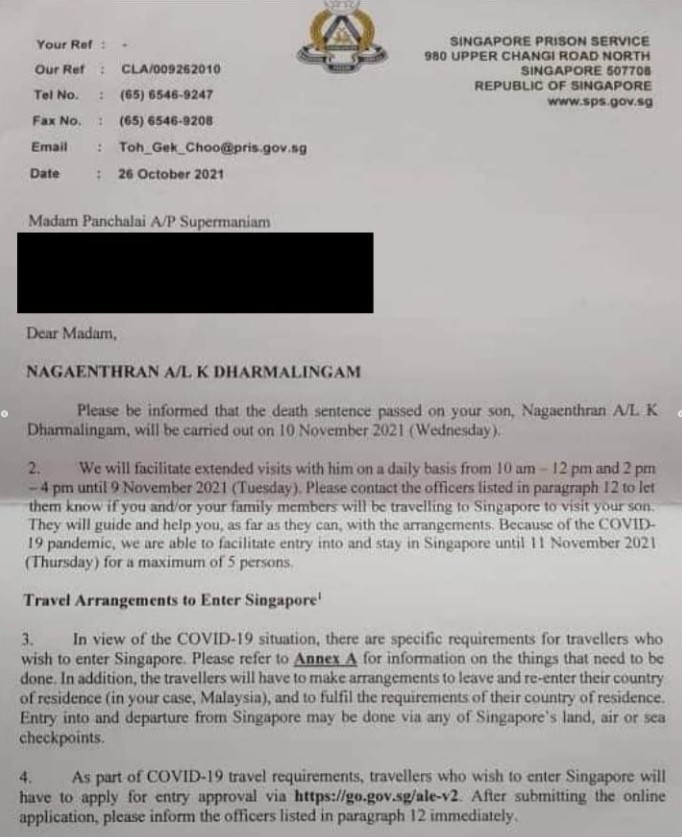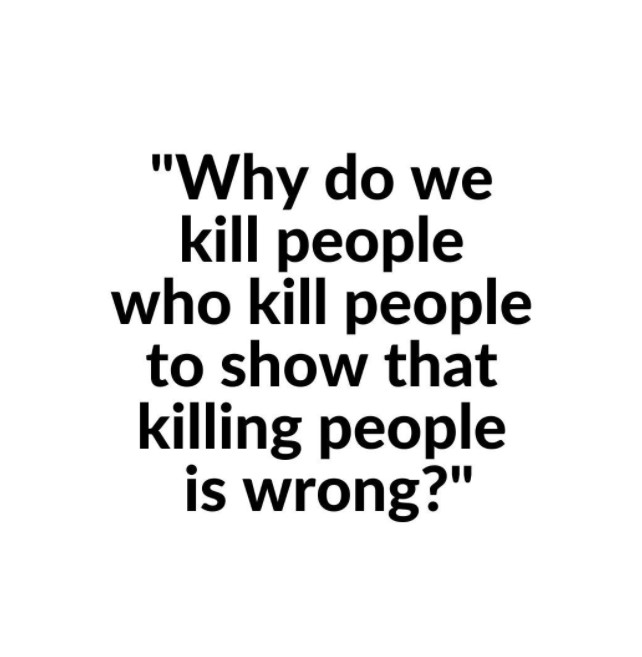Upon seeing this headline, two questions probably come to mind:
- Who is Richard Branson, and why is he against the death of a drug trafficker?
- Who is this drug trafficker, and what was the extent of his crimes such that it warranted the death penalty?
Before getting into Richard Branson’s opposition, let’s talk about the drug trafficker first:
His Name is Nagaenthran Dharmalingam
In 2009, Nagaenthran Dharmalingam, hailing from the Malaysian city of Ipoh, aged 21 then, was caught by Singaporean Immigration police at Woodlands Checkpoint for smuggling 42.72 grams of diamorphine, a type of strong opioid used to treat severe pain caused by cancer.
During his trial in 2019, he denied knowing what the contents strapped to his thigh were, and that he had been coerced to bring the package across the border under the threat that his girlfriend would be killed if he didn’t.
Despite his many pleas and appeals, Nagaenthran was tried and sentenced to the death penalty a year later under the Misuse of Drugs Act.
Under the Misuse of Drugs Act of 1973, Second Schedule on Offences Punishable on Conviction, it states the following: “Unauthorised traffic in controlling drug containing such quantity of diamorphine being—(b) more than 15 grammes,” the death penalty will be meted out.
Hence, a year after his trial began, Nagaenthran was sentenced to death by hanging.
Mental Disabilities
However, Nagaenthran’s case proved to be controversial because assessments by psychiatrists noted that he had “intellectual disabilities” and has a lower-than-average IQ of 69.

One of the clinical psychologists and psychiatrists even concluded that, “[the accused’s] borderline intelligence and concurrent cognitive deficits may have contributed towards his misdirected loyalty and poor assessment of risks in agreeing to carry out the offence.”
Under the United Nations (UN) Convention on the Rights of Persons with Disabilities, which Singapore is part of and has signed, the law allows an accused person to be acquitted or released from charges if he or she was found to be “suffering from the abnormality of the mind”.
By proceeding in the execution of a man who may not even fully comprehend the consequences of his actions, nor his rights in court, ran contrary to this point established in law, because Nagaenthran was exhibiting that he was incapable of knowing the nature of the act and that he was incapable of knowing what he was doing was either morally or legally wrong under dire circumstances.
It should come to no surprise that his death sentence did not sit well with many people, regardless of what their standpoints on the death penalty are.
The reason is simple:
While Singapore cites that most of its citizens believe in the deterring effect that death penalty has on crimes like drug trafficking, the same citizens might not believe as strongly in the death penalty when they are given specific situations, such as the case of a mentally impaired man under duress.
Trials, appeals, and pardons exist in law because there are always caveats and exceptions.
Nagaenthran happens to be one of them.
Public Protests
Thus, on 8 November 2021, just two days before Nagaenthran was sentenced to be hanged in Singapore after spending more than a decade on death row, a candlelight vigil in protest against his impending execution was held in front of the Singaporean embassy in Kuala Lumpur, Malaysia.
Supporters held pictures of Nagaenthran in black and white, echoing the same sentiments of “STOP THE EXECUTION of Nagaenthran Dharmalingam”, with the hashtag #SAVENAGAETHRAN.

Death Sentence Postponed
In a fit of irony, what saves Nagaenthran from his impending death was not the loud protests, his intellectual disabilities, his declining mental health after spending so many years in prison, or his deficit hyperactivity disorder (ADHD).
Rather, it was the fact that the now 33-year-old-man had tested positive for COVID-19 the day before he was scheduled for his execution.
After Nagaenthran recovers from COVID-19, the recovery might just take his life.
The Court of Appeals will hear his challenge to his sentence for the last time once he recovers fully from COVID-19, and if it fails, his last hope will be a grant of clemency from the President herself to avoid his fate of being tied to the hangman’s noose.
Callousness of the Criminal Justice System
Now, imagine that you are the mother of Nagaenthran, and you receive a chilling type-written letter, completely devoid of any sympathy for the impending execution of your son.

“Please be informed that the death sentence passed on your son, Nagaenthran A/L K Dharmalingam, will be carried out on 10 November 2021 (Wednesday).”
Following that statement, it highlights the difficulty of travelling arrangements due to COVID-19 safety restrictions and measures, and that they have to apply for entry approval in order to catch the last glimpse of their son before he is sent to the gallows.
For Nagaenthran’s family, they had to struggle with their son’s imminent death whilst being confronted with PCR tests, travelling paperwork, their accommodations in Singapore, and fitting in the necessary 10-day quarantine period upon arriving in Singapore.
Local Activist Kristen Han, who has been advocating against the death penalty for many years, expressed the pains that the family had to cope with as she aided them through the extensive paperwork.
After being separated from your son for so many years, and then having to deal with?
By this point, the word ‘sympathy’ is not enough to convey what should be felt for this family.
Join our Telegram channel for more entertaining and informative articles at https://t.me/goodyfeedsg or download the Goody Feed app here: https://goodyfeed.com/app/
The Man Called Richard Branson
Richard Branson is the individual who founded the multinational venture capital conglomerate called the Virgin Group in 1970.

In March 2020, he started leading a high-profile campaign against death penalty, calling for the abolition of capital punishment worldwide.
His campaign has already drawn support from influential business leaders all around the world, which includes Meta (formerly Facebook) Chief Operating Officer Sheryl Sandberg, Ben & Jerry’s co-founders Ben Cohen and Jerry Greenfield, and Malaysian tycoon Tony Fernandes of region airlines AirAsia.
Nagaenthran’s case had caught Branson’s attention when it made international headlines.
Branson had reiterated his stance for the Singapore government to spare Nagaenthran’s life before Monday’s crucial hearing (24 Jan).
He stated that it would “cast serious doubts” on Singapore’s global reputation and its claims that it would “uphold international agreements”.
The British billionaire adds, “It’s also worth remembering the main countries that still have the death penalty: China, North Korea, Saudi Arabia and Iran. They’re not the best bedfellows for Singapore, a sophisticated country, to be in the same bed with.”
Branson’s Starting Argument
In Branson’s perspective, not only does Nagaenthran’s case emphasise the cruel absurdity of capital punishment, but it also highlights the additional challenges faced by those with intellectual and psychosocial disabilities in being able to obtain true justice.
In failing to take into account Nagaenthran’s intellectual challenges, the police questioning him had seen the inconsistencies in his statements as a means to convict and depict him as an individual with a “criminal mind”.
For the same reasons, Nagaenthran has been held on death row for 11 years, with the High Court believing that his intellectual disabilities were not a reason to denounce his crimes, and that the accused “knew what he was doing”.
Branson strongly believes Nagaenthran’s range of mental impairments should be tenable in court.
If consistent and repeated proof of Nagaenthran’s mental disability, paired with the UN Convention on Rights of People with Disabilities, is not enough to make Singapore withdraw the death sentence, then there would undoubtedly be fallout in terms of whether Singapore can be a country that prides itself with its faithfulness to the law.
The Crux of Branson’s Opposition
In Branson’s blog post, what he fundamentally attacks is the notion of whether these draconian and archaic capital punishments actually have the deterrent effect that its supporters exalt.

He points out that in many Asian countries, death sentences have been imposed on drug trafficking crimes as a way to present a zero-tolerance approach with harsh consequences in their fight against drugs, but there has never been compelling evidence that it has a deterrent effect.
On the contrary, in spite of the number of people that enter the gallows year after year, the drug trade has scarcely been impacted.
The global drug trade continues to expand and become more readily available around the world compared to any point in history, in fact.
“If deterrence is the objective, these laws have failed miserably. And they will continue to fail. What countries really need is comprehensive drug policy reform that focuses on harm reduction and public health, not on crime and punishment.” Branson writes.
The ones taking the brunt of the punishments in Southeast Asian countries are usually the mules, the desperate, the people struggling to eke out a livelihood and have no choice but to turn to dark alternatives, never the Kingpins who function elsewhere in another continent.
The couriers have never profited much from doing the legwork.
“It’s cases like Nagaenthran’s that illustrate why the death penalty is broken beyond repair,” Branson says before turning to the singular figure in Singapore who holds the authority of giving pardons, for the much needed and long-deprived clemency, “Madam President, please spare his life and let’s work together to end executions for good.”
Branson’s overall view on capital punishment is that it has no place in modern society.
Readers, what are your thoughts then?
Read Also:
- Everything About the Lee Zii Jia Saga Whereby He Was Banned After Quitting M’sia National Team
- All Government Agencies Will Have Anti-SMS Spoof System After OCBC SMS Phishing Scam
- Briton Fined $5,000 for Head-butting Stranger Outside Nightclub after a Dispute
Featured Images: Shutterstock (Belish) & Virgin Group




